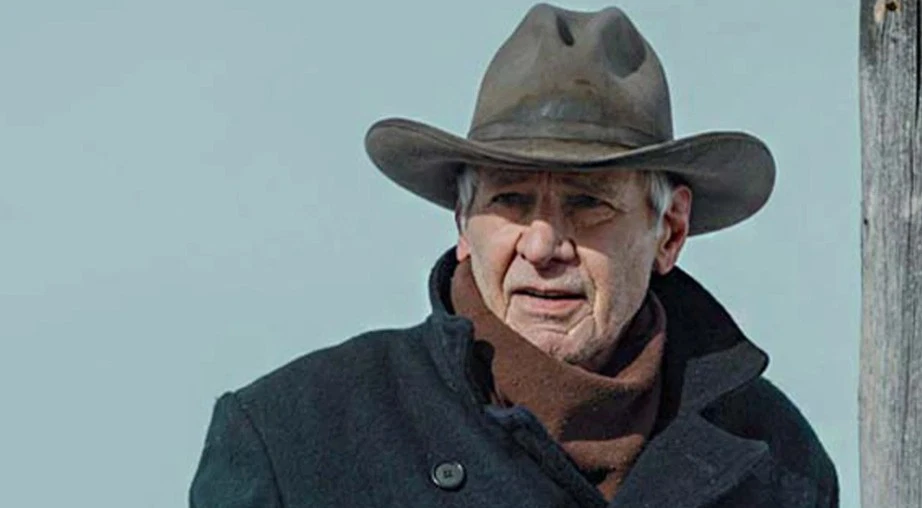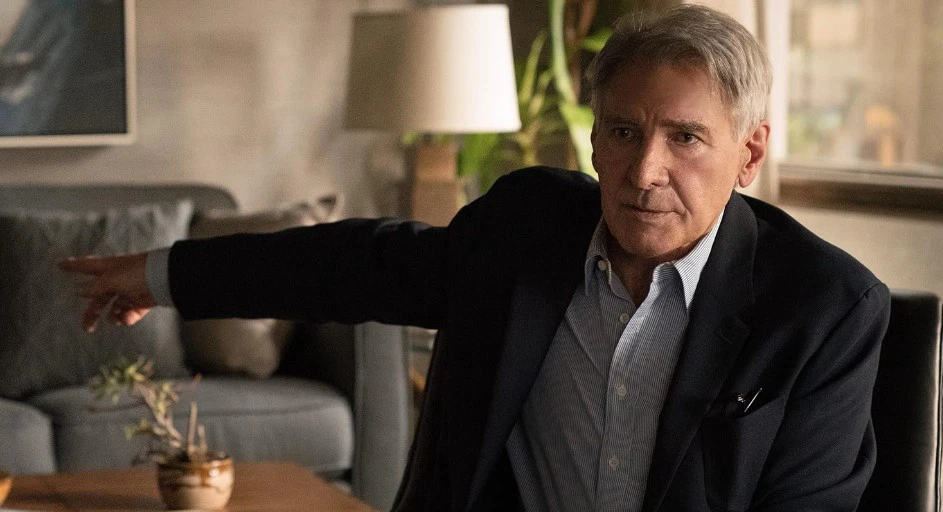There are scenes you watch—and then there are scenes that watch ‘you’. That being said, some actors read lines. Others open veins. Harrison Ford did the latter. If you saw Shrinking’s Thanksgiving scene, you know the tears that came weren’t leftover from the onions in the stuffing. They were real, gut-punching, heart-stabbing sobs—the kind you can’t bottle up or brush off.
I watched Harrison Ford, the silver-haired legend, unravel before our eyes with a performance that could melt the coldest cynic into a puddle. “Leaning,” he said. Just that. And somehow that single word carried the weight of grief, gratitude, and aging. Everyone on set cried. I cried. Even the cat curled beside me looked up like, “you good?”
Now that—that was the Ford we deserved in 1923. But instead, Taylor Sheridan gave us scraps when we could’ve had a feast. And that… is a storytelling sin I can’t forgive.
Shrinking: Harrison Ford’s scene so tender, it could break a brick wall

In the finale of Shrinking, Harrison Ford’s character, Paul finally let his guard down—not with theatrics, but with a quiet, aching truth. “I’m leaning on you,” he said through tears, standing at the Thanksgiving table like a weathered oak finally ready to fall into the arms of its forest.
This wasn’t just acting. It was therapy in dialogue form. And it wasn’t just the viewers who lost it. As Lukita Maxwell, who plays Alice, shared:
Everyone was crying. My grandmother passed away a couple years ago, and she had Parkinson’s, and she never talked about her emotions… I felt a catharsis watching Harrison say these things and talk about his fears and his hopes.
That’s the power of performance with heart—where fiction mirrors life so closely that you forget you’re watching a show. And it broke me, too. Because this wasn’t about death, it was about dignity in facing it. Michael Urie, who plays Brian, put into words what many of us felt:
I’ve seen, if not every movie, then like 90% of his movies, and I’ve never seen him be better than [playing Paul]. He’s always great. But that was so deep.
And then he hit us with this gut punch:
He’s still going strong with no signs of slowing down. But there’s an inevitability when you hear him talk about that, when you start to think about when he stops and when he’s done and when he slows down, and it was very moving.
Urie also revealed that Ford delivered that intensity in every single take. Even when the camera wasn’t on him. That’s not just professionalism; that’s artistry.
Shrinking gave us Harrison Ford—Taylor Sheridan’s 1923 wasted him

Now let’s flip the coin.
Harrison Ford’s portrayal of Jacob Dutton was rich with potential—grit and gravitas soaked into every line. But the second season of 1923 failed to give his arc a proper sendoff. They buried him in subplots, and just as Jacob could’ve passed the torch to Spencer or mentored Jack, they snuffed him out. Why did Ford accept this role? To quote him:
I took the job only because my friend [Helen Mirren] had signed up already and knowing her, the wisdom of her choices and the opportunity that she alone presents. Forget about the script, I signed on knowing some of what Taylor had done, having had a very, very detailed conversation with him on our one meeting prior to shooting.
Ford said it was a “revelation”—and yet we, the audience, were left craving more.
Don’t get me wrong. Taylor Sheridan’s 1923 isn’t a bad TV show—it was technically brilliant. Gorgeous cinematography, well-cast performances, and moments that made you flinch, weep, and even rage. But the storytelling? It fumbled when it should have flown.
We got Jacob Dutton, hardened by time, standing at the edge of legacy. But what did Sheridan do? Gave us more Whitfield torture scenes than Dutton wisdom. There was such a missed opportunity to let Jacob’s final arc sing. Instead, Jacob’s brilliance was sidelined—his legacy boxed up and put in storage.
Yes, I know that even Helen Mirren praised Sheridan’s vision :
When the scripts arrived, it was like a journey into the unknown… It’s one man’s vision and voice, which is so distinctive and so beautifully constructed.
Sure, that voice is bold. But even Shakespeare needed an editor. One of the most emotional gut punches in 1923 season 2 was the death of Alexandra. The heartbreak was biblical, but the opportunity for Jacob to hold the family together in the aftermath? Wasted.
Jacob did get a beautiful line, though:
If a shooting star could talk.
Poetry. But imagine more of that. Imagine Ford giving a monologue about grief, about carrying your family’s name like a cross up a mountain. Instead, Spencer took center stage, and Jacob faded into the fog.
So, give legends like Ford roles that match their weight. Let them speak. Let them feel. Let them lead. Because when Harrison Ford leans in—really leans in—it doesn’t just move characters. It moves us!